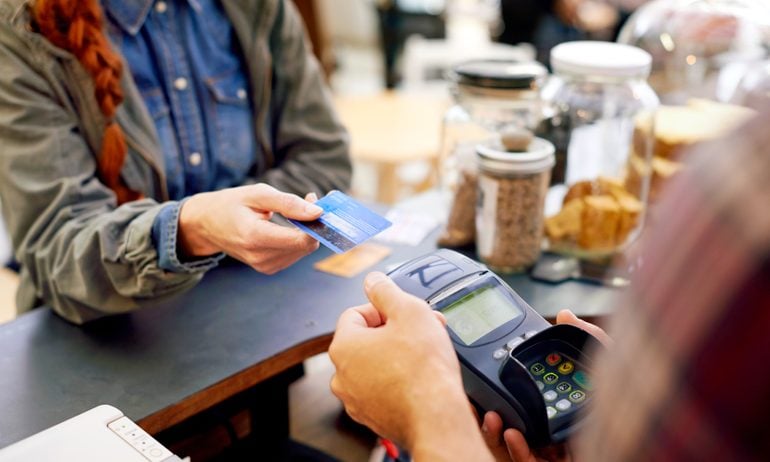Smart Credit Card Moves to Make in a Recession
Reassessing your wallet can help you remain resilient when times get tough.

Many or all of the products on this page are from partners who compensate us when you click to or take an action on their website, but this does not influence our evaluations or ratings. Our opinions are our own.
We’re not in a recession (as of this writing, at least), but that doesn't mean people aren't stressed. A NerdWallet survey found that 85% of Americans have concerns about tariffs, with 45% worrying that tariffs will result in a recession.
Experts aren’t too far behind in their fears. In early April, for example, J.P. Morgan Research raised their probability of a recession in 2025 to 60%, up from 40% at the beginning of 2024.
“There’s a lot of worry and concern right now in what is unknown, but there’s comfort in what is known,” says Bruce McClary, senior vice president, membership and communications at the National Foundation for Credit Counseling (NFCC). “There’s a lot that may be outside of your control, but there’s a lot within your control if you have the right information and take the right steps.”
Even if you’re in a stable position, there are ways to increase your financial resilience, and that includes taking a hard look at your credit. When times get tough, your credit health matters. It can give you more options if you need to spread out payments for unexpected expenses, open a new card, or negotiate with your card issuer for help if you’re struggling to afford your bills.
Regardless of whether we actually end up in a recession this year, these actions can help you feel more prepared to handle whatever comes your way.
1. Review your spending
The first step is knowing how much money you have coming in and going out, and step two is breaking down exactly what you’re spending money on. This is where you can put technology to work. According to Estela Nagahashi, interim CEO of University Credit Union, artificial intelligence-based budgeting tools can quickly tell you how much you spend in certain categories.
You can upload credit card and bank statements to ChatGPT, for example, and ask it to break down your spending by category. It can even craft charts illustrating your spending totals. “This can help you understand your spending and build a plan,” she says.
2. Check in on your emergency fund
Despite the name, an emergency fund isn’t just for the cost of a visit to urgent care. According to Brad Clark, an investment advisor representative in Indianapolis, emergencies are just irregular expenses. “They happen all the time.”
The NFCC’s 2025 Financial Literacy and Preparedness Survey found that 48% of U.S. adults feel like they are constantly treading water financially, and any unexpected expense could pull them under.
Adjusting your budget can free up more money to stash in your emergency fund. And having that money available can help you avoid or limit credit card debt when your roof leaks or your car needs new tires.
3. Keep your credit scores in good shape
Maintaining high credit scores can give you options. You’re more likely to qualify for a wider variety of credit cards, get access to other loans at lower interest rates, get approved for a rental home and more. This becomes important if you need a loan or the ability to relocate for job opportunities.
Economic conditions can also affect your access to credit based on your scores. Lenders tightened their belts in 2020, and many balance transfer credit cards stopped accepting new applications. Those that were still available required excellent credit to qualify.
A major way to keep your credit scores healthy is to pay all bills on time. This includes credit card bills, loan payments, and other expenses including rent and utilities. Just one missed payment can substantially lower your credit scores. Turn on text and email alerts on your credit issuer’s app so you don’t miss a due date, or set up autopayments for your credit card and other bills to make sure you avoid late payments.
4. Make a plan for debt repayment
A debt repayment method like debt avalanche or snowball (where you prioritize your payments either by interest rate or amount owed) can help keep you organized. But be strategic about where you carry a balance, too.
“You’re not doing yourself any favors if you’re carrying the largest balance on the card that charges the highest interest rate,” McClary says.
This is where debt consolidation can come in handy, because it allows you to move higher-interest debt to a new loan that charges less interest, saving you a considerable amount of money as you pay down debt.
If you have credit card debt, now is the time to look into personal loans and balance transfer credit cards. In times of economic turmoil, lenders get cautious, making it potentially more difficult to qualify.
5. Look for card benefits that matter to you
Credit card rewards can help lower costs, whether you earn cash back on your everyday purchases or rack up points you can use to travel at a discount.
Balance transfer cards, and cards with no-interest offers for new purchases, give you time to pay down a balance at 0% APR.
Your card might come with other perks that can be helpful, like cell phone and travel insurance, eliminating the need to pay for these protections separately.
Your card may also provide the ability to pay off a recent large purchase in installments. “Many credit cards now offer the ability to convert selected transactions into low interest payments, but over a third [of] indebted cardholders don’t know if their card offers a payment plan or not,” said John Cabell, managing director of payments intelligence at J.D. Power, in an email.
These features can help you save money, but it’s important to understand how they work. Nagahashi recalled a recent conversation with a credit union member. They used a card with a no-interest promotion to buy an air conditioning unit, but didn’t realize that interest would begin to accrue if they didn’t pay off the balance by the time the promotion ended.
“I always tell my members, 'Pay attention to terms and conditions,'” she says.
6. Don’t hesitate to ask for help
If you’re unable to afford your credit card bills, don’t hide from your card issuer. Gather information about your financial situation, such as your credit scores, your budget and current sources of income. Call the number on the back of your card and talk to the bank about adjustments it might be willing to make to help you at this moment.
You’ll have more negotiating power if you ask for help before you miss payments. According to Nagahashi, issuers will be reluctant to work with you if your credit card bill is overdue by more than 90 days.
“Your credit card company doesn’t really know what’s happening in real time that’s influencing your ability to pay them on time,” McClary says. “You’re helping them help you find alternatives to going into debt collection or worse.”
Article sources
NerdWallet writers are subject matter authorities who use primary,
trustworthy sources to inform their work, including peer-reviewed
studies, government websites, academic research and interviews with
industry experts. All content is fact-checked for accuracy, timeliness
and relevance. You can learn more about NerdWallet's high
standards for journalism by reading our
editorial guidelines.
Find the right credit card for you.
Whether you want to pay less interest or earn more rewards, the right card's out there. Just answer a few questions and we'll narrow the search for you.
Related articles







